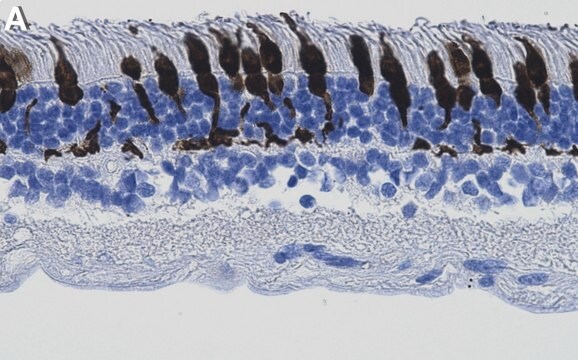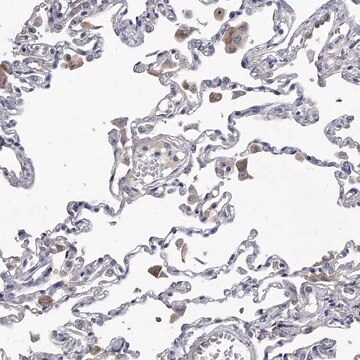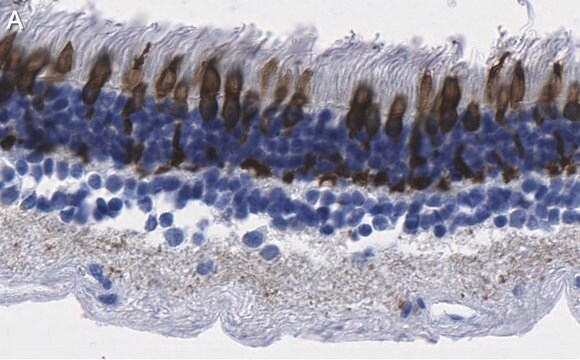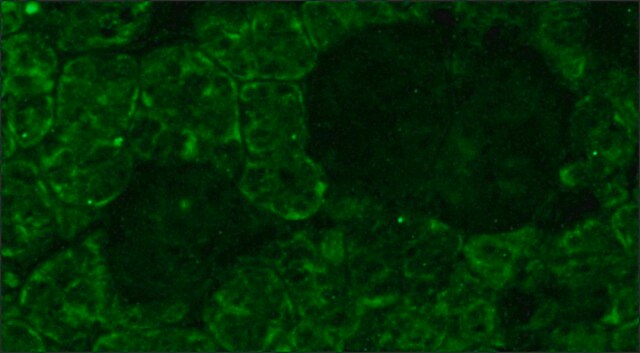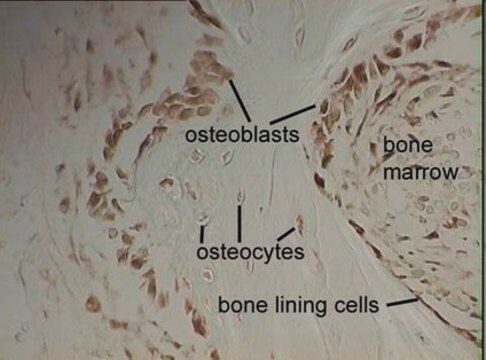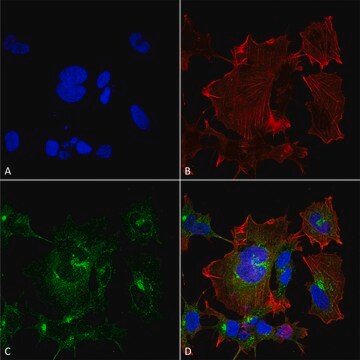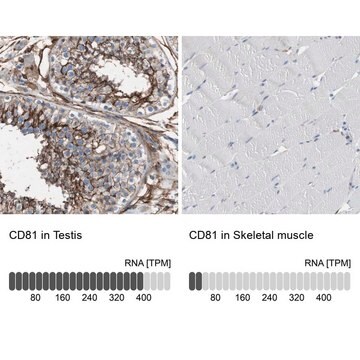MABN2492
Anti-Green/Red Cone Opsin Antibody, clone 7G8
clone 7G8, from mouse
同義詞:
Medium-wave-sensitive opsin 1, Green cone photoreceptor pigment, Green-sensitive opsin, GOP, Long-wave-sensitive opsin 1, Red-sensitive opsin, ROP)
登入查看組織和合約定價
全部照片(1)
About This Item
分類程式碼代碼:
12352203
eCl@ss:
32160702
NACRES:
NA.43
推薦產品
生物源
mouse
抗體表格
purified immunoglobulin
抗體產品種類
primary antibodies
無性繁殖
7G8, monoclonal
物種活性
human
技術
immunohistochemistry: suitable (paraffin)
同型
IgG1κ
NCBI登錄號
目標翻譯後修改
unmodified
基因資訊
human ... OPN1MW(2652)
一般說明
Medium-wave-sensitive opsin 1/Long-wave-sensitive opsin 1 (UniProts: P04001; P04000; also known as Green cone photoreceptor pigment, Green-sensitive opsin, GOP/ Red cone photoreceptor pigment, Red-sensitive opsin, ROP) are encoded by the OPN1MW (also known as GCP)/OPN1LW (also known as RCP) genes in human. The full range of color discrimination in humans is based on the presence and function of three cone photoreceptors. Each cone type possesses a photo-sensitive pigment-protein complex consisting of 11-cis retinal and a unique opsin protein that gives sensitivity in the short (S cone, peak sensitivity about 420 nm), middle (M cone, peak sensitivity about 530 nm with polymorphism), and long (L cone, peak sensitivity about 560 nm with polymorphism) wavelengths of the light spectrum. Opsins are multi-pass membrane proteins that belongs to the G-protein coupled receptor 1 family. They consist of four extracellular, 7 helical, and four cytoplasmic domains. Genes for the three types of cone opsins and the rod photoreceptor rhodopsin gene seem to be homologous with varying amounts of conservation. Strongest conservation is between the middle (green) and long (red) wavelength sensitive pigments on the X chromosome, suggesting a relatively recent duplication/divergence event. The S cone (blue) opsin seems to have a stronger conservation with rhodopsin. Cone photoreceptor distribution in humans is dominated by the M and L cone pigments. Mutations in OPN1MW and OPN1LW genes are known to cause color blindness that is characterized by a dichromasy in which red and green are confused, without loss of luminance or shift or shortening of the spectrum. Some mutations also lead to cone dystrophy leading to progressive degeneration of the cone photoreceptor with some preservation of rod function. (Ref.: Neitz, M., and Neitz, J. (2000). Arch. Ophthalmol. 118(5); 691-700).
特異性
Clone 7G8 specifically detects human green/red opsin.
免疫原
Full-length purified green/red human opsin.
應用
Anti-Green Red Cone Opsin, clone 7G8, Cat. No. MABN2492, is a highly specific mouse monoclonal antibody that targets Medium-wave-sensitive opsin 1 and Long-wave-sensitive opsin 1 and has been tested for use in Immunohistochemistry (Paraffin).
Research Category
Neuroscience
Neuroscience
品質
Evaluated by Immunohistochemistry (Paraffin) in human retina tissue sections.
Immunohistochemistry (Paraffin) Analysis: A 1:250 dilution of this antibody detected Green/Red Cone Opsin in human retina tissue sections.
Immunohistochemistry (Paraffin) Analysis: A 1:250 dilution of this antibody detected Green/Red Cone Opsin in human retina tissue sections.
標靶描述
40.58 kDa calculated.
外觀
Protein G purified
Format: Purified
Purified mouse monoclonal antibody IgG1 in buffer containing 0.1 M Tris-Glycine (pH 7.4), 150 mM NaCl with 0.05% sodium azide.
儲存和穩定性
Stable for 1 year at 2-8°C from date of receipt.
其他說明
Concentration: Please refer to lot specific datasheet.
免責聲明
Unless otherwise stated in our catalog or other company documentation accompanying the product(s), our products are intended for research use only and are not to be used for any other purpose, which includes but is not limited to, unauthorized commercial uses, in vitro diagnostic uses, ex vivo or in vivo therapeutic uses or any type of consumption or application to humans or animals.
未找到適合的產品?
試用我們的產品選擇工具.
分析證明 (COA)
輸入產品批次/批號來搜索 分析證明 (COA)。在產品’s標籤上找到批次和批號,寫有 ‘Lot’或‘Batch’.。
我們的科學家團隊在所有研究領域都有豐富的經驗,包括生命科學、材料科學、化學合成、色譜、分析等.
聯絡技術服務
